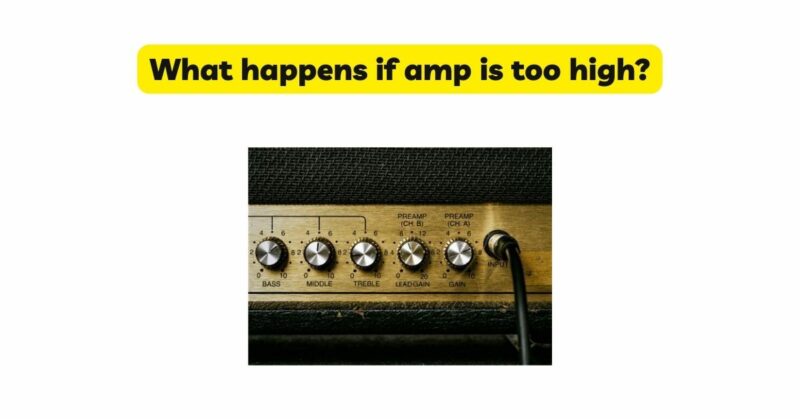Amplifiers are the backbone of audio systems, providing the power necessary to drive speakers and deliver captivating sound. However, using an amplifier that is too powerful for your setup can have adverse effects. In this article, we will explore the potential consequences of an overpowered amplifier and shed light on the risks and effects it can have on your audio equipment and listening experience.
Understanding Amplifier Power Ratings: Amplifiers are rated based on their power output, typically measured in watts. The power rating indicates the maximum power the amplifier can deliver to the connected speakers. It is essential to choose an amplifier that matches or closely matches the power requirements of your speakers to ensure optimal performance and avoid potential problems.
Consequences of an Overpowered Amplifier:
- Speaker Damage: Using an amplifier with significantly higher power output than the speakers can handle puts them at risk of damage. When an amplifier delivers excessive power, it pushes the speakers beyond their intended limits. This can cause the speaker components, such as the voice coil, cone, and suspension, to be strained or even fail. The result can be distortion, reduced sound quality, and physical damage to the speakers.
- Distortion and Clipping: An overpowered amplifier can lead to distortion and clipping, which negatively affect the audio quality. Distortion occurs when the amplifier is driven beyond its limits, resulting in a distorted sound that lacks clarity. Clipping happens when the amplifier is pushed into its maximum output capability, causing the waveform to be clipped or distorted. Clipping not only degrades the sound quality but can also cause additional stress on the amplifier and speakers.
- Reduced Lifespan: Using an amplifier with excessive power can significantly reduce its lifespan. Overpowering the amplifier puts a strain on its internal components, such as the power supply, output transistors, and circuitry. The amplifier may have to work harder and generate more heat to handle the excess power, leading to increased wear and tear. This can result in a shorter lifespan for the amplifier, requiring more frequent repairs or replacement.
- Safety Hazards: Overpowering an amplifier can create safety hazards, particularly in extreme cases. The excess power demands can cause the amplifier to overheat, potentially leading to component failure or even fire. Additionally, the increased voltage and current levels associated with overpowering an amplifier can pose a risk of electrical shocks if proper safety measures are not in place.
Preventing Amplifier Overpowering: To avoid the risks associated with an overpowered amplifier, it is crucial to understand the power requirements of your speakers and select an amplifier that matches or closely matches those requirements. Consider the speakers’ power handling capabilities, impedance, and sensitivity when choosing an amplifier. Consult the manufacturer’s recommendations or seek expert advice to ensure a proper match between your amplifier and speakers.
Additional Considerations:
- Headroom and Dynamic Range: Having some headroom, which refers to the available power beyond the average listening level, is desirable. It allows for dynamic peaks in the music without straining the amplifier or speakers. However, excessive headroom can result in underutilization of the amplifier’s capabilities.
- Speaker Sensitivity: Speaker sensitivity, measured in decibels (dB), indicates how loud a speaker will play with a given amount of power. Higher sensitivity speakers require less power to produce the same volume level as lower sensitivity speakers. When selecting an amplifier, consider the sensitivity of your speakers to ensure an appropriate match.
- Room Size and Acoustics: The size and acoustics of your listening room should also be taken into account. Larger rooms or rooms with poor acoustic properties may benefit from an amplifier with more power to fill the space and overcome any acoustic challenges. Conversely, smaller rooms with good acoustics may not require as much power.
Conclusion: Using an amplifier that is too powerful for your speakers can lead to various negative consequences, including speaker damage, distortion, reduced lifespan, and safety hazards. It is crucial to carefully match the power requirements of your speakers with the amplifier’s capabilities to ensure optimal performance, sound quality, and longevity. By understanding the risks and effects of an overpowered amplifier, you can make informed decisions when selecting and using audio equipment, ultimately preserving the integrity of your system and enhancing your listening experience.


